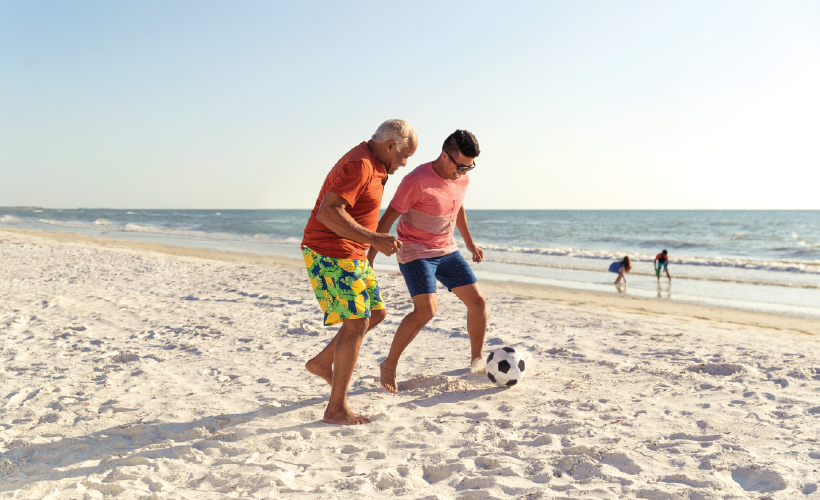By Christina Joseph Robinson
Two years into my father’s recovery from bypass surgery complications, my mother surprised me with a one-week vacation to Paris. I’d never been and always dreamed about it, yet I couldn’t help feeling guilty for leaving my ailing dad behind. But my mom knew I needed a break.
For the better part of my dad’s sickness, if he wasn’t confined to a hospital room, he was living with me. In addition to working a full-time job, I arranged doctor visits, maintained medication lists, handled his finances, cooked for him, and constantly fretted over his physical and mental well-being, sometimes to the detriment of my own.
Giving more attention to the health of your loved one than yourself is a common occurrence for caregivers, who make up 16 percent of Americans. Logistically, it makes sense: Caregivers spend an average of 20 hours a week tending to loved ones. “To be the best caretaker for your loved one, you’ve got to give yourself permission to take care of yourself,” explains Andy Lee, Aetna’s chief mindfulness officer, who spent years as a caregiver to his wife.
Here are some steps you can take to preserve your well-being so you can be present for the ones who need you most.
Plan ahead and get organized
Before you begin your care giving duties, it helps to get organized. Decide what tasks you can take on yourself or divide among willing family members. And identify what extra resources you’ll need, especially if you’re handling everything alone. Having a concrete plan in place can give you a sense of calm, especially when new issues arise.
Check with your community and home health agencies plan to see what resources are available. Aetna Medicare Advantage members and their caregivers can tap into the Resources For Living® program, which provides access to consultants who help find services and resources in the community to help meet everyday needs. The call is free, but members are responsible for any expenses associated with the services they use.
Ask for help
Caregiving can be physically and emotionally exhausting, and you may feel the desire to take on everything yourself. Trying to be a superhero could lead to burnout, and that’s not good for anyone. Asking for help is especially important if your loved one has a chronic condition, like cancer.
Experts recommend accepting offers of help, and giving those eager to lend a hand some ideas about how to help. You may find that removing just one item off your list can make all the difference when you’re feeling overwhelmed. “It’s helpful to spread the wealth,” says Shara Sosa, a Virginia-based oncology therapist and cancer survivor. “Remember that [caring for a loved one] is a marathon, not a sprint.”
Establish your own emotional support system
It’s normal to experience a range of emotions as a caregiver, including sadness, guilt, frustration and anger. Find a support group or someone you trust who can relate. Not only can you compare tips and resources, you also have someone else to lean on for emotional support. If you’re reluctant to share your thoughts, find other ways to express yourself, such as journaling or painting.
However, there may be times when you’ll need to seek professional help. Stress, anxiety, depression and other mental health conditions are common among caregivers. The Family Caregiving Alliance reports that 40 to 70 percent of caregivers have clinically significant symptoms of depression.
If you’re experiencing any signs of caregiver distress, such as anger, social withdrawal or depression, talk with someone you trust or a mental health professional. Aetna Medicare members, for instance, have access to Resources for Living, which can help them find local support groups.
Find time to socialize and relax
Caring for someone can feel isolating at times. Remember, it’s OK to give yourself permission to do the things that you enjoy. You can also find activities to do with your care recipient that don’t revolve around caregiving. Those small moments can raise your spirits and bring the two of you closer together.
Though it may be hard, try to relax. Reducing stress and anxiety gives you more energy and mental capacity to handle the tasks of caregiving. Get a massage or try some deep breathing, visualization or meditation to help clear your mind. You can find meditation tools in the Aetna App Room.
Need to stay close to home? Walk around the block or read a book for pleasure. Even small actions like chewing gum or drinking tea have been shown to reduce stress and improve focus.
Maintain your physical well-being
The physical demands of caring for another adult can also take their toll. About 1 in 10 caregivers say their physical health has declined since taking on the role. Caregivers have a higher risk of developing physical ailments, from acid reflux and headaches to more serious, chronic conditions like heart disease, diabetes and arthritis.
Exercising can help. Start small by walking with a friend or signing up for a class at your local gym. If you can’t leave the house, do some gentle stretches or jog up and down the stairs (you’re probably doing it anyway, so just add a few more trips).
Not only will being active improve your health, it can also boost your mood. Studies show people who exercise at least two to three times a week experience significantly less depression, anger and stress than those who work out less frequently or not at all.
Eat healthy food
It’s easy to forget to eat healthy when you’re constantly on duty. But without proper nutrition, you’ll feel sluggish or hyperactive. Eating a diet of nutritious food at regular intervals leads to a healthy level of energy with fewer mood fluctuations, an overall happier outlook and an improved ability to focus, says Dr. Gabriela Cora, a board-certified psychiatrist, plant-based nutrition certified physician, and medical director for Aetna Behavioral Health. In fact, studies show that a healthy diet can alleviate symptoms of depression and anxiety.
If you’re pressed for time, assemble individual servings of nutritious food, such as almonds or cheese and crackers. Prepare several days of meals at once, and leave fresh fruit on the table to make it easier to grab and go.
Get plenty of rest
You can’t care for someone else effectively if you’re tired. Find a bedtime routine that works for you so you can recharge for the next day. Experts recommend adults get at least seven hours of sleep a night. Here are a few steps you can take to rest well: Avoid heavy meals before bedtime. Run a warm bath for yourself or read a book. And dim the lights and limit electronic devices late at night because artificial lights can confuse your internal clock.
Self-care is an essential part of ensuring you’ll be there for those who need you most. When I returned from Paris, I was well-rested, upbeat and ready to resume my duties as a caregiver. My dad felt better, too. He knew things were difficult for both of us, and seeing me smile made him happy.
For more information on how caregivers can care for themselves, visit Aetna’s resource for caregivers




